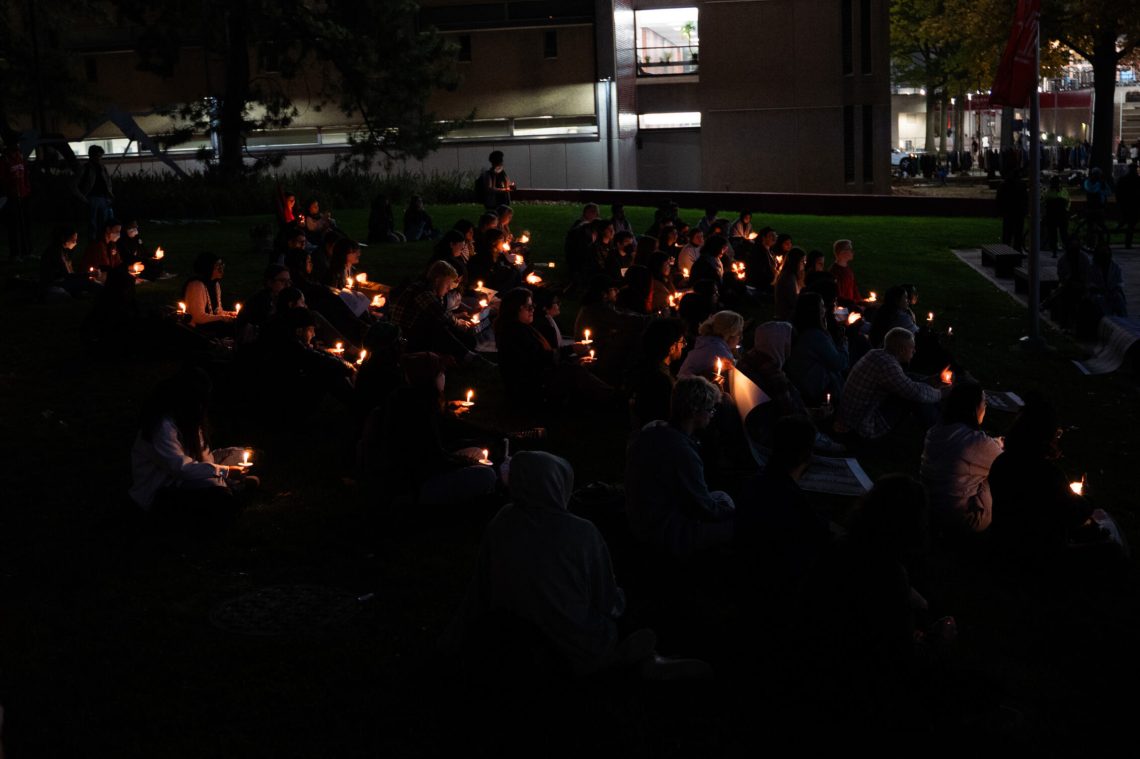
Just after 4:30 p.m., silence fell upon approximately fifty students and Palestinian supporters gathered at Beury Beach for an emotional interfaith vigil on Tuesday, honoring those killed in Gaza and the West Bank amid the latest Israel-Hamas war.
“The Palestinians are human beings,” said Pastor Jay Bergen of the Germantown Mennonite Church, a speaker at the event. “Muslims are human beings. Arabs are human beings. We have run out of language to say this, and so sometimes we just have to gather in silence.”
Temple University Students for Justice in Palestine and the Philly Palestine Coalition, a Free Palestine advocacy organization, organized the candlelit gathering, where attendees held printed photos of Palestinian victims, mournfully referred to as martyrs.

Since the Palestinian militant group Hamas attacked Israel on Oct. 7, killing more than 1,400 and kidnapping about 240 Israelis, the Israeli government has retaliated with a military campaign that has killed more than 10,000 Palestinians, most of them women and children, NPR reported.
After a member of SJP opened the vigil with a moment of silence and introduced the pastor, Bergen delivered their speech about grieving those lost.
Between speakers, students swapped abrasive claps for gentle finger snapping, fostering a somber atmosphere of peace and remembrance.
Quaisar Abdullah, a communications professor, delivered the Al-Fatiha, an Islamic prayer for guidance and mercy, and spoke of the Muslim principle of the Shahadah, or witness to God, emphasizing that the deceased in Gaza who aren’t Muslim also deserve justice.
“This is not a religious issue,” he said. “This is a human issue. As a Muslim, I am required to stand up against injustice and for justice, even if it was Muslims who are committing that injustice.”
Ethan Cohen, a graduate history student, spoke on behalf of Jewish Voice for Peace, a Jewish pro-Palestinian organization, sharing three demands for Israel: stop the eviction of Palestinians, give all groups equal rights and allow any evicted Palestinians to return to their homes.
As Cohen’s speech concluded, an anonymous member of the Philly Palestine Coalition took the megaphone for an emotional message about the lives lost in Gaza, condemning the Israeli assault as genocide.
“What’s happening in Gaza is an outright genocide,” the speaker said. “It’s a brutal assault on the lives of innocent civilians, on the dreams and aspirations of families and on those who took up arms in the face of unbearable odds.”
Next, a law student and member of Temple Muslim Law Students Association, who chose not to share their name for safety reasons, recited a poem about four boys who were killed by an Israeli naval attack while playing soccer on a beach in Gaza, which was reported by ABC News in 2014.
“What do you say to children for whom the Red Sea doesn’t part?” the poem asked.
Pastor Brendan Van Gorder of Crescentville United Methodist Church then led the group in a breathing exercise.
He continued with a speech condemning President Richard Englert’s response to the conflict, before encouraging the audience to uplift each other. Students looked to their surrounding friends and peers, exchanging words of love and messages of support.
On Oct. 13, Englert shared a message condemning Hamas for terrorism, four days after he made an announcement offering support to students who may have been affected by the attacks.
SJP posted an open message on social media to the university, expressing their frustration at Englert’s lack of acknowledgment of Palestinian lives lost in the conflict, and started a petition, which has amassed more than 1,500 signatures, urging the university to release a statement recognizing the Palestinian lives lost.

After Van Gorder’s speech, Tanseem Siddiqui, a professor at Drexel University, shared her personal experience as a Palestinian and messages from people currently in the Palestinian territories, including her own father.
“Our struggles are connected because our lives are connected, our hearts are connected,” Siddiqui said. “The spirit that breathes life in me is the spirit that breathes life in you, and all forms of creation.”
Then, an SJP member who chose not to share their name for safety reasons told stories of displacement and death from Palestinians and invited the audience to do the same. One audience member came to the megaphone and shared a story about a person killed in the violence in Gaza.
“This interfaith vigil is an opportunity for us to show that this genocide that is being committed is a humanitarian issue more than it is a matter of religion,” SJP wrote in a statement to The Temple News. “The numbers of lives lost almost feel unreal, and we just wanted an opportunity to share their stories and say their names. Because they are not just numbers, each victim has a story and it deserves to be shared.”
On November 2, United Nations officials warned that “Palestinian people are at grave risk of genocide.” The experts shared disappointment at Israel’s continued assault on Gaza.
Natalia Opoku, a senior media studies and production major, is a longtime supporter of the Free Palestine movement and attended the vigil hoping to support her peers and the Palestinian cause.
“I think it’s very important to spread awareness all around, and if you don’t know about it, educate yourself,” Opoku said. “I feel like asking people when you’re not sure about it is important, but just being aware or wanting to know more about this, at the very least, is what we can all do.”
On Thursday at 11:30 a.m., SJP and TMLSA will host a second campus walkout at the Bell Tower, as a part of the national event “Shut It Down for Palestine.”


Be the first to comment